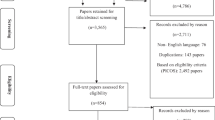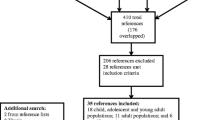Abstract
A prospective study of the role of comorbid substance abuse and dependence and mood disorders in the outcome from pathological gambling. A naturalistic sample of pathological gamblers who had recently quit gambling (N = 101) was followed and data were available for 83% of participants at 3 months, 80% at 12 months, and 52% at 5 years. Those participants with a drug diagnosis during their lifetime were less likely to have a minimum 3 month period of abstinence, and those who had been involved in gambling treatment were more likely to have a minimum 12 months of continuous abstinence. Lifetime gambling problem severity and involvement in gambling treatment were most commonly associated with a shorter time to achieving a period of abstinence of any length. Lifetime history of a mood disorder also predicted a longer time to reach a minimum 3 months of continuous abstinence. Both gambling treatment and an alcohol diagnosis follow up predicted an increase in the odds of experiencing a relapse from a minimum 6 month period of abstinence. Overall, comorbid mental health disorders are predictive of shorter term but not longer term outcome.
Similar content being viewed by others
References
Crockford, D. N., & el-Guebaly, N. (1998). Psychiatric comorbidity in pathological gambling: A critical review. Canadian Journal of Psychiatry, 43, 43–50.
el-Guebaly, N., Patten, S. B., Currie, S., Williams, J. V. A., Beck, C. A., Maxwell, C. J., et al. (2006). Epidemiological associations between gambling behavior, substance use & mood and anxiety disorders. Journal of Gambling Studies, 22, 275–287.
Gerstein, D., Murphy, S., Toce, M., Hoffmann, J., Palmer, A., Johnson, R., et al. (1999). Gambling impact and behavior study. A report to the National Gambling Impact Commission. Chicago, Illinois: National Opinion Research Center at the University of Chicago.
Hodgins, D. C., Currie, S. R., el-Guebaly, N., & Diskin, K. M. (2007). Does providing extended relapse prevention bibliotherapy to problem gamblers improve outcome? Journal of Gambling Studies, 24, 41–54.
Hodgins, D. C., & el-Guebaly, N. (2000). Natural and treatment-assisted recovery from gambling problems: A comparison of resolved and active gamblers. Addiction, 95, 777–789.
Hodgins, D. C., & el-Guebaly, N. (2004). Retrospective and prospective reports of precipitants to relapse in pathological gambling. Journal of Consulting and Clinical Psychology, 72, 72–80.
Hodgins, D. C., & Makarchuk, K. (2003). Trusting problem gamblers: Reliability and validity of self-reported gambling behavior. Psychology of Addictive Behaviors, 17, 244–248.
Hodgins, D. C., & Peden, N. (2005). The natural course of gambling problems: Forty month follow-up. Journal of Gambling Issues [on-line], from http://www.camh.net/egambling/issue14/jgi_14_hodgins.html.
Hodgins, D. C., Peden, N., & Cassidy, E. (2005). The association between comorbidity and outcome in pathological gambling: A prospective follow-up of recent quitters. Journal of Gambling Studies, 21, 255–271.
Lesieur, H. R., & Blume, S. B. (1987). The South Oaks Gambling Screen (SOGS): A new instrument for the identification of pathological gamblers. American Journal of Psychiatry, 144, 1184–1188.
Petry, N. M., Stinson, F. S., & Grant, B. F. (2005). Comorbidity of DSM-IV pathological gambling and other psychiatric disorders: Results from the National Epidemiologic Survey on Alcohol and Related Conditions. Journal of Clinical Psychiatry, 66, 564–574.
Petry, N. M., & Weinstock, J. (2007). Internet gambling is common in college students and associated with poor mental health. The American Journal on Addictions, 16, 325–330.
Slutske, W. S. (2006). Natural recovery and treatment-seeking in pathological gambling: Results of two U.S. national surveys. American Journal of Psychiatry, 163, 297–302.
Sobell, L. C., & Sobell, M. B. (1992). Timeline followback: A technique for assessing self-reported ethanol consumption. In J. Allen & R. Z. Litten (Eds.), Measuring alcohol consumption: Psychosocial and biological methods (pp. 41–72). Totowa, NJ: Humana Press.
Spitzer, R. L., Williams, J. B., Gibbon, M., & First, M. B. (1990). Structured clinical interview for DSM-III-R users guide. Washington, DC: American Psychiatric Press.
Welte, J., Barnes, G., Wieczorek, W., Tidwell, M., & Parker, J. (2001). Alcohol and gambling pathology among U.S. adults: Prevalence, demographic patterns and comorbidity. Journal of Studies on Alcohol, 62(70), 6–712.
Author information
Authors and Affiliations
Corresponding author
Rights and permissions
About this article
Cite this article
Hodgins, D.C., el-Guebaly, N. The Influence of Substance Dependence and Mood Disorders on Outcome from Pathological Gambling: Five-Year Follow-Up. J Gambl Stud 26, 117–127 (2010). https://doi.org/10.1007/s10899-009-9137-9
Received:
Accepted:
Published:
Issue Date:
DOI: https://doi.org/10.1007/s10899-009-9137-9




